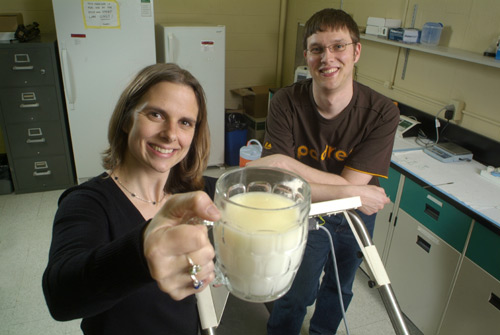Exercising Before Eating a Fatty Meal Has Benefits, New Study Finds
June 10, 2010 - News Release
Getting a bit of exercise the day before you plan to eat a high-fat meal can help reduce the negative effects fatty foods have on your body, according to a new University of Guelph study.
"Since it's difficult for people to cut out all high-fat meals in their diet, we wanted to see if exercising a day prior might improve the way the body responds to these fatty foods,” said Prof. Lindsay Robinson of the Department of Health and Nutritional Sciences.
These researcher findings were featured in today's Toronto Star.

Robinson, along with PhD student Mark Dekker, discovered that even low-level exercise such as going for an hour-long walk a day in advance of eating a high-fat load reduced lipid levels in the body by 30 per cent.
“Lipids in the blood will typically rise and stay elevated for hours after ingesting a high-fat meal, which is a risk factor for cardiovascular disease,” said Robinson. “We found that doing something as simple as walking can help prevent these levels from spiking.”
The study, which was recently published in the Journal of Nutritional Biochemistry, involved overweight men between 40 and 70 years of age who already had high blood lipid levels.
The researchers chose to focus on men with high lipid levels because they found in a previous study that these men respond more negatively to fatty foods than men with lower lipid levels do.
“We wanted to see if a bit of exercise could help less active men with high lipid levels because they are at a high risk for heart disease,” said Dekker.
Instead of loading up on fast food, participants drank a fat cocktail developed by the researchers made only with lipids. Using a fat cocktail provides more accurate results because a typical fast-food meal includes various carbohydrates and proteins that can influence the body’s response, said Robinson.
“We wanted to develop a pure fat beverage so that we could isolate the body’s response to fat and have better control over the types and amount of fat being ingested.”
A day before drinking the fat cocktail, participants walked on the treadmill for an hour or remained sedentary.
The researchers then tested the lipid levels in the participants’ blood and abdominal fat tissue to determine the difference in levels when the participants walked compared with when they didn’t do any exercise.
Dekker said the significant reduction in lipid levels shows that low to moderate exercise can be used to not only help counteract the negative effects of a high-fat meal but also as a way for people with high lipid levels to manage these levels.
“A lot of people take medication to lower their lipid levels, and these drugs are very effective,” he said. “But we have shown that any type of exercise, even walking the dog, can also be very effective.”
Contact:
Prof. Lindsay Robinson
Department of Human Health and Nutritional Sciences
519-824-4120, Ext. 52297
lrobinso@uoguelph.ca
For media questions, contact Communications and Public Affairs: Lori Bona Hunt, 519-824-4120, Ext. 53338, or l.hunt@exec.uoguelph.ca, or Deirdre Healey, Ext. 56982 or d.healey@exec.uoguelph.ca.